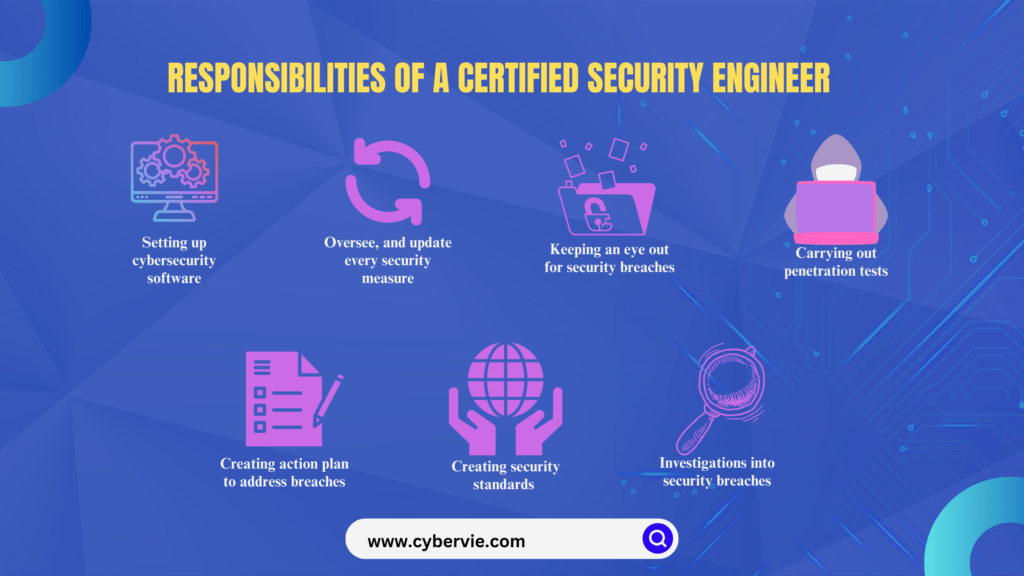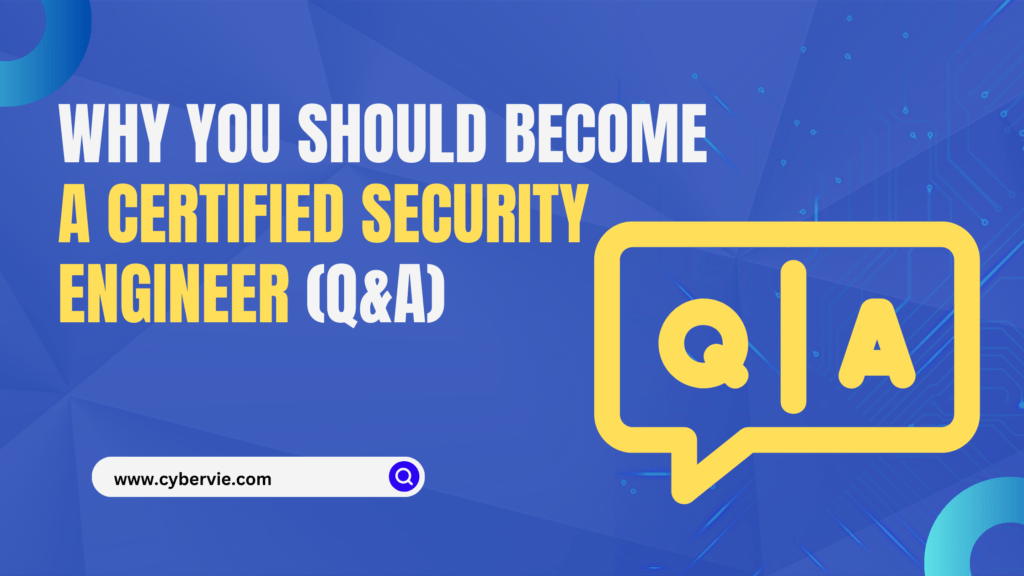Why You Should Become A Certified Security Engineer
Are you trying to find a career where you can really make a difference, have a bright future, and a decent salary potential? Then becoming a qualified safety engineer is the best option!
The need for cybersecurity experts is greater than ever as the digital world keeps growing. Among these experts, Certified Security Engineers (CSEs) are essential for safeguarding private data and maintaining network integrity.
The demand for qualified specialists in this fascinating field is rising. However, what does a security engineer actually perform, and is this the career path for you? You need not worry; we have you covered! All of your urgent inquiries regarding becoming a certified safety engineer will be addressed in this blog.
What Is A Certified Security Engineer?
An expert in creating, putting into practice, and managing security procedures to safeguard an organization’s IT infrastructure is known as a certified security engineer. They are skilled at spotting weaknesses, handling security issues, and making sure rules and industry standards are followed.
Is Coding Necessary For A Certified Security Engineer?
The fact that having a qualified security engineer certification does not require advanced coding knowledge is one of its most alluring features. The main focus is on comprehending security policy, risk management, and system design; while a rudimentary understanding of coding can be helpful, this makes the assignment easy for those with an eye, with the exception of the larger one on cybersecurity strategies and business issues.
A cybersecurity engineer should normally meet the requirements listed below.
- Must have a degree in IT, systems engineering, computer science, or other similar fields
- Minimum of two years of cybersecurity experience including incident management and litigation
- Must have experience with implementation, maintenance and operation of firewalls and other endpoint security
- Must be proficient in languages or tools such as Java, C++, Node, Ruby, Python, Go, and PowerShell
- Must have the ability to work in a fast-paced environment
- They should be up to date on the latest hacker techniques and cybersecurity issues.
It should be noted that different organizations have different qualification requirements. A comprehensive list of requirements that an organization may apply for is provided above.
Cybersecurity also requires non-technical jobs: Read more
Why Is This A Future Booming Career?
In the upcoming years, the cybersecurity sector is predicted to increase at an exponential rate. It is anticipated that the size of the worldwide cybersecurity industry would increase from $190.4 billion in 2023 to $298.5 billion in 2028. Throughout the projected period, this trend is expected to continue at a CAGR of 9.4%, which will increase demand for highly trained security engineers.
For the following reasons, there is an increasing need for certified security engineers. Here are a few explanations for the increased popularity of this segment:
- Cybersecurity risks: Just as technology is always changing, so are cyber threats. Experts that can defend systems, networks, and data from hostile attacks are essential for organizations. Digital asset protection is a critical function of certified security engineers.
- Privacy concerns and data breaches: The significance of robust security measures has been brought to light by significant data breaches. Businesses make significant investments in cybersecurity to avert these kinds of problems and foster client trust.
- Adherence to regulations: Organizations are required to have robust security procedures to comply with strict requirements (including GDPR, HIPAA, and PCI DSS). Certified specialists assist businesses in adhering to regulatory requirements.
- Adoption of cloud computing: Although cloud computing is popular, there are new security risks. Cloud-native infrastructure apps require security engineers with a strong cloud-learning background.
- Internet of Things (IoT) and connected gadgets: As IoT devices proliferate, so does the attack surface. To safeguard networks and smart devices, security engineers are required.
- Lack of skills: Four million qualified workers in cybersecurity are lacking in the world. To close this gap, businesses are actively hiring trained security engineers.
What Kind Of Salary Can You Expect?
Numerous factors can affect a qualified safety engineer’s pay. Here are a few observations:
- Payscale.com shows that information security engineers with experience in AWS typically earn a basic salary of $124,333.
- According to Salary.com, the average base pay for AWS security engineers is $118,355.
- According to Glassdoor.com, the average basic pay is $127,385; the average supplemental pay is $27,804, which includes stock options, bonuses, and other benefits.
This calculation indicates that the average salary for holders of the AWS certified security – special certificate will be about $133,488. Depending on experience and region, a certified safety engineer’s annual compensation might vary from $90,000 to $130,000. Employees with specialized training and expertise may also be able to demand higher pay.
What Are The Key Certifications For A Certified Security Engineer?
As a certified safety engineer, obtaining multiple certifications can help you progress in your career. The following are some of the most well-known certificates:
- In the field, the Certified Information Systems Security Professional (CISSP) credential is widely accepted.
- A Certified Ethical Hacker (CEH) is someone who understands how to protect against attacks by focusing on the viewpoint of a hacker.
- Information security management and governance are highlighted by the Certified Information Security Manager (CISM).
- CompTIA Security+: A certification for beginners that covers a lot of ground in security.
What Are The Responsibilities Of A Certified Security Engineer?

Depending on the business and industry, a cybersecurity engineer’s duties might vary greatly, however, these are some of the more common ones:
- Selecting and configuring cybersecurity software, evaluating an organization’s security needs, and creating best practices that
- Cybersecurity professionals design, implement, oversee, maintain, and upgrade every security measure needed to protect an organization’s networks, systems, and data.
- Keeping an eye out for security breaches on networks
- Carrying out penetration tests to find any weaknesses, reporting the frequency, kind, and severity of security lapses
- Creating and carrying out an action plan to address such breaches
- Creating best practices and security standards that organizations should adhere to keeping updated of the most recent security tools and threats
- Supporting investigations into security breaches
What Skills Are Essential For Success?
A few crucial abilities are necessary to succeed as a Certified Security Engineer:
- Analytical thinking: The capacity to evaluate intricate systems and spot any weak points.
- Problem-solving: Coming up with workable answers to security-related problems fast.
- Paying close attention to details: Carefully inspecting systems to make sure no vulnerabilities are missed.
- Communication: Clearly explaining security procedures and hazards to stakeholders and non-technical employees.
- Continual learning: Keeping abreast of the most recent developments in cybersecurity.
How To Start Your Journey Towards Becoming A Certified Security Engineer?
A career as a Certified Security Engineer offers a promising future, with opportunities for advancement, excellent pay, and the opportunity to make a significant impact in the protection of digital assets
CSEP – Certified Security Engineer Professional Certification is a comprehensive cybersecurity training program designed to provide you with essential knowledge and skills. Whether you are an experienced IT professional or a recent graduate, CSEP provides you with the skills and information you need to succeed in the cybersecurity field, regardless of your level of experience as an IT professional or your date of graduation.
The need for qualified security engineers is higher than ever since cybersecurity threats are always changing. The CSEP curriculum gives you the information, abilities, and certifications you need to face these difficulties through practical instruction.
Don’t miss this opportunity. Register now and start your journey to a rewarding career in cybersecurity.







